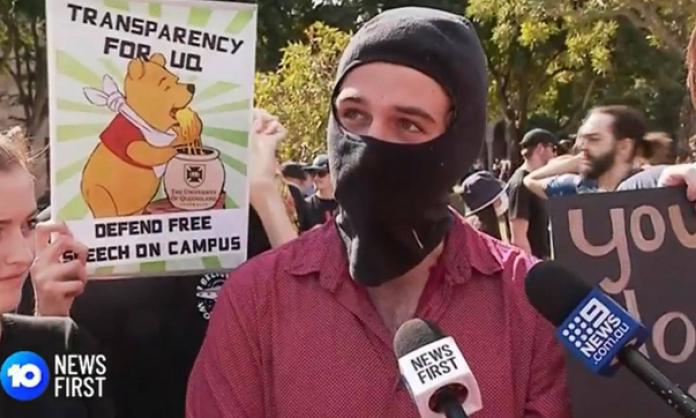In an ugly display, hundreds of students gathered in the Great Court at the centre of the University of Queensland yesterday to protest the Confucius Institute and “foreign influence” and to “celebrate freedom in Australia”.
The protest followed attacks by Chinese nationalists last week at a demonstration in solidarity with the movement for democratic rights in Hong Kong and Xinjiang. While that demonstration had been led by Hong Kong students, with solidarity from a broad range of campus activists including Socialist Alternative, this rally was different.
It was organised by a group of domestic students calling themselves Transparency 4 UQ, focused on the Chinese Communist Party’s alleged threat to freedom of speech at the university.
Some protest organisers said that “there was no room for racism” at the protest. But it was impossible to keep it out, given the nationalist nature of the demonstration. After the violence of the preceding week, social media groups connected to UQ exploded with anti-Chinese racism, with posts calling for anti-Chinese riots, posts mocking Chinese accents and calling for the deportation of those who had mobilised against the Hong Kong solidarity demonstration.
Left wing student organisations, anti-racists and academics signed a statement arguing that nationalism would not take the struggle for solidarity with Hong Kong forward. It called for the demonstration to be cancelled due to the racist sentiments it was helping to organise. Transparency 4 UQ pushed ahead regardless.
A speaker from the Liberal Democratic Party, Andrew Cooper, who is helping to organise next week’s Conservative Political Action Conference in Sydney, was pulled from the line-up at the last minute because of his associations with figures such as Brexit Party leader Nigel Farage and right wing commentator Bettina Arndt. While the event organisers claimed publicly to have been unaware of Cooper’s politics, in social media posts they admitted that they knew of his background but dropped him so Andrew Bartlett of the Greens, the only speaker with any association with the left, would not pull out as a speaker. This was a cynical effort to put a more favourable face on an ugly demonstration.
The protesters overwhelmingly were domestic students, with small numbers of Tibetans and Falun Gong practitioners from off campus also attending. A handful of people from Hong Kong also came. There was an unprecedented mobilisation of police, including plain clothes officers, who circled the Great Court. A similarly unprecedented media scrum threatened to dwarf the rally itself, reflecting how anti-China sentiment is amplified by every news outlet.
One domestic student carried a placard bearing homophobic slurs about Xi Jinping, while others wore balaclavas fearing “facial recognition technology” from China. A leaflet that circulated through the crowd raised the spectre of “Chinalisation” [sic] of Australia, fearmongering about Chinese international student numbers, sold out baby formula in stores and the Confucius Institute brainwashing children.
The rally was opened by a speech from one organiser, Maddy Taylor, who said: “UQ is selling out our personal freedom ... for blood money” from China. This theme of Australian “freedom” being undermined by Chinese influence ran through almost every speech.
Andrew Bartlett spent most of his time highlighting the need to avoid anti-Chinese racism and focus on corporate interference in academia. But his opposition to the Confucius Institute on this basis gave liberal cover to the other nationalistic speakers.
Miles Whiticker of the Pirate Party ranted that “free speech and free expression have been a cornerstone of our democracy for 100 years” but were being undermined by China. He ended by reading aloud a statement from the excluded far right speaker, Andrew Cooper.
Other speakers from the Falun Gong, Tibet and Hong Kong described the real oppression those groups face from Communist Party authoritarianism. The contrast and disconnect between these speeches and those made by Australian speakers was as stark as night and day. The effect, however, was to reinforce the sense of racist paranoia at the demonstration.
The rally was both symptomatic of, and contributing to, growing anti-Chinese racism in Australia. Mobilised expressions of nationalism such as these will further strengthen the Australian government’s ability to call for a more aggressive approach in its rising imperialist confrontation with China.
For Chinese people in Australia, like Muslims after 2001, these rising tensions will only mean greater surveillance and heightened suspicion. While the far right did not get a direct platform at this demonstration, the way liberal nationalism can give succour to the far right was on display. Anti-racists on campus are alert to combatting any further nationalist organising.




